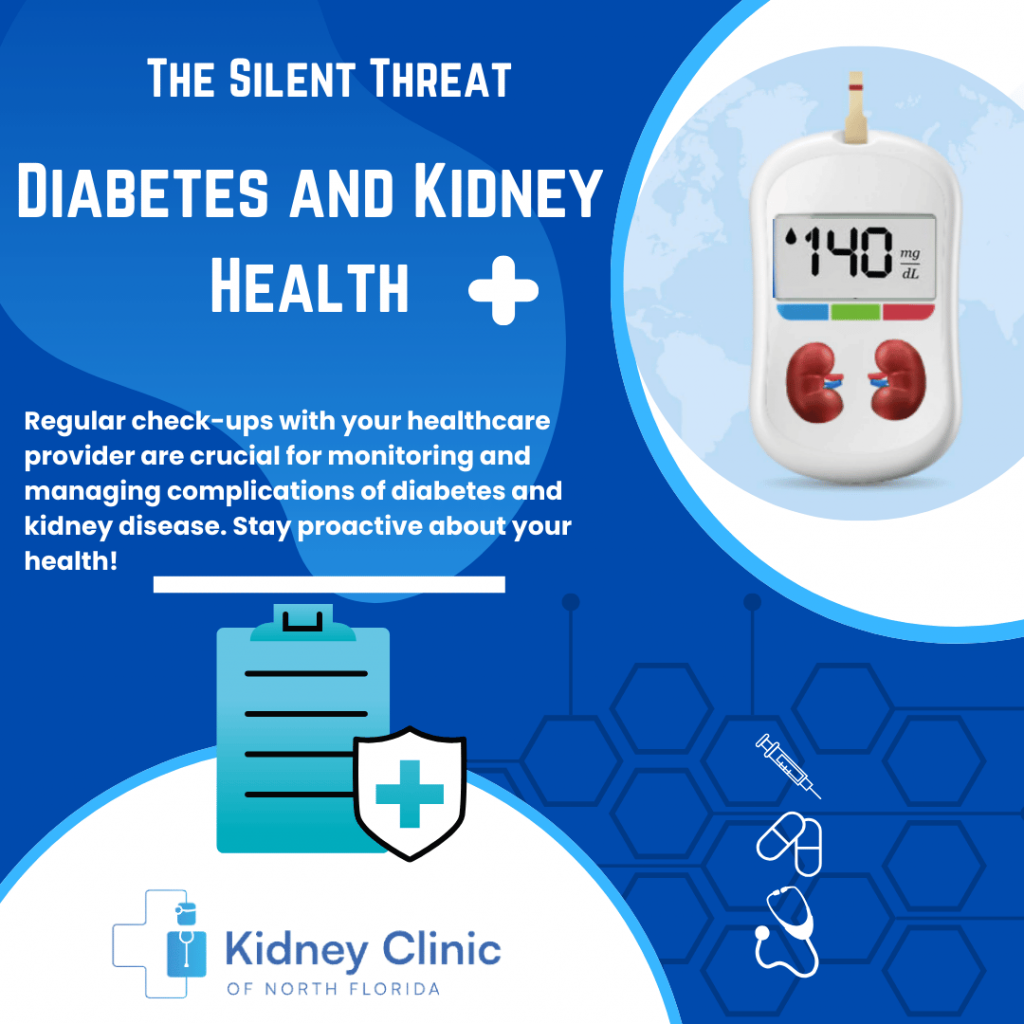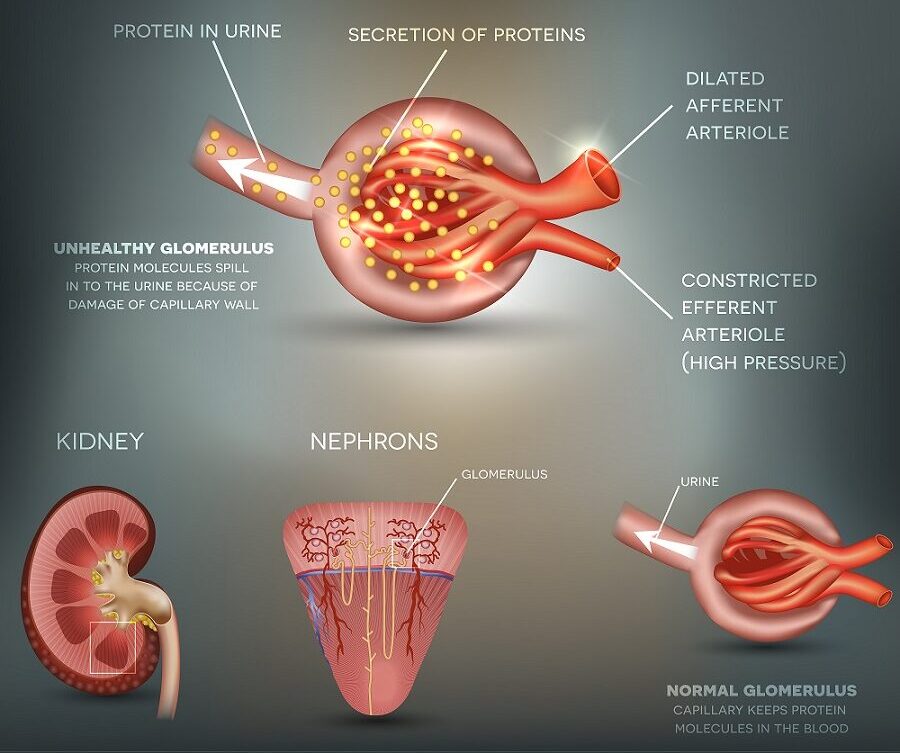Diabetes, a chronic condition characterized by high blood sugar levels, can lead to a host of complications if not managed properly. One of the most serious complications is its effect on the kidneys, which can result in a condition known as diabetic nephropathy. This blog will explore how diabetes affects the kidneys, the symptoms and stages of diabetic nephropathy, and the importance of early detection and management.
Understanding Diabetic Nephropathy
Diabetic nephropathy is kidney disease or damage that results from diabetes. High blood sugar levels over time can damage the blood vessels in the kidneys, impairing their ability to filter waste products from the blood effectively. This condition is a leading cause of chronic kidney disease (CKD) and end-stage renal disease (ESRD) worldwide.
How Diabetes Affects the Kidneys
1. Damage to Glomeruli
The kidneys contain millions of tiny filtering units called glomeruli. Each glomerulus acts like a sieve, filtering waste products from the blood while retaining essential substances like proteins and red blood cells. High blood sugar levels can damage the glomeruli, causing them to become thickened and scarred. This damage impairs the kidneys’ filtering ability, leading to the leakage of proteins (albumin) into the urine, a condition known as albuminuria.
2. Increased Blood Pressure
Diabetes can also cause high blood pressure, which further damages the kidneys. The delicate blood vessels in the kidneys are particularly susceptible to damage from hypertension. Over time, this increased pressure can cause the blood vessels to narrow, weaken, or harden, reducing the kidneys’ ability to filter blood effectively. This creates a vicious cycle, as kidney damage can also lead to increased blood pressure.
3. Hyperfiltration
In the early stages of diabetes, the kidneys may compensate for high blood sugar levels by filtering more blood than usual, a process known as hyperfiltration. While this may seem beneficial initially, over time, it places extra stress on the glomeruli, accelerating kidney damage.
4. Inflammation and Fibrosis
Chronic high blood sugar levels can lead to inflammation and fibrosis (scarring) in the kidney tissues. This fibrosis replaces healthy kidney tissue with non-functional scar tissue, progressively reducing the kidneys’ ability to filter blood and regulate fluid and electrolyte balance.
Symptoms of Diabetic Nephropathy
Diabetic nephropathy typically develops slowly over many years, and early stages may not present noticeable symptoms. As the condition progresses, symptoms may include:
- Proteinuria: Presence of protein in the urine which also can make the urine look foamy, often one of the first signs of kidney damage.
- Swelling (Edema): Swelling in the hands, feet, and around the eyes due to fluid retention.
- Increased Blood Pressure: Worsening hypertension that is difficult to control.
- Fatigue: Feeling tired or weak due to the buildup of waste products in the blood.
- Frequent Urination: Increased need to urinate, especially at night.
- Nausea and Vomiting: As waste products build up in the blood, it can cause gastrointestinal symptoms.
- Loss of Appetite: Decreased interest in food and unintended weight loss.
Stages of Diabetic Nephropathy
Diabetic nephropathy progresses through several stages:
1. Hyperfiltration: Early increased filtration rate and slight enlargement of the kidneys.
2. Microalbuminuria: Small amounts of albumin in the urine, often detectable only with special tests.
3. Macroalbuminuria: Larger amounts of albumin in the urine, indicating more significant kidney damage.
4. Declining Kidney Function: Decreasing glomerular filtration rate (GFR), leading to accumulation of waste products in the blood.
5. End-stage renal Disease (ESRD): Severe loss of kidney function requiring dialysis or a kidney transplant.
Importance of Early Detection and Management

Early detection and management of diabetic nephropathy are crucial to slowing the progression of kidney damage. Here are some key strategies:
1. Regular Screening
- Urine Tests: To detect microalbuminuria or proteinuria.
- Blood Tests: To monitor blood sugar levels, kidney function (creatinine and GFR), and electrolyte balance.
- Blood Pressure Monitoring: To ensure it remains within a target range.
2. Blood Sugar Control
Maintaining tight control of blood sugar levels is essential to prevent or slow the progression of kidney damage. This can be achieved through:
- Medications: Including insulin and oral hypoglycemic agents.
- Diet and Exercise: Adopting a healthy diet and regular physical activity to maintain stable blood sugar levels.
3. Blood Pressure Management
Keeping blood pressure within a target range helps protect the kidneys from further damage. This can involve:
- Medications: Such as ACE inhibitors or ARBs, which are particularly effective in protecting kidney function.
- Lifestyle Changes: Including reducing salt intake, maintaining a healthy weight, and avoiding smoking.
4. Monitoring and Managing Complications
Regular check-ups with a healthcare provider are essential to monitor for and manage complications of diabetes and kidney disease. This includes:
- Managing Dyslipidemia: Controlling cholesterol levels to reduce cardiovascular risk.
- Addressing Anemia: Treating anemia that may result from reduced erythropoietin production by the kidneys.
- Preventing Infections: Ensuring vaccinations are up-to-date and practicing good hygiene to reduce the risk of infections, which can be more severe in individuals with diabetes and kidney disease.
Conclusion
Diabetes has a profound impact on the kidneys, leading to diabetic nephropathy—a serious and progressive condition. Understanding the effects of diabetes on the kidneys and recognizing the early signs of kidney damage can help in taking proactive steps to manage and slow the progression of kidney disease. Regular screening, tight blood sugar control, blood pressure management, and addressing complications are essential strategies for protecting kidney health in individuals with diabetes.
If you have diabetes and are concerned about your kidney health, consult a nephrologist or your healthcare provider for personalized advice and management strategies.




